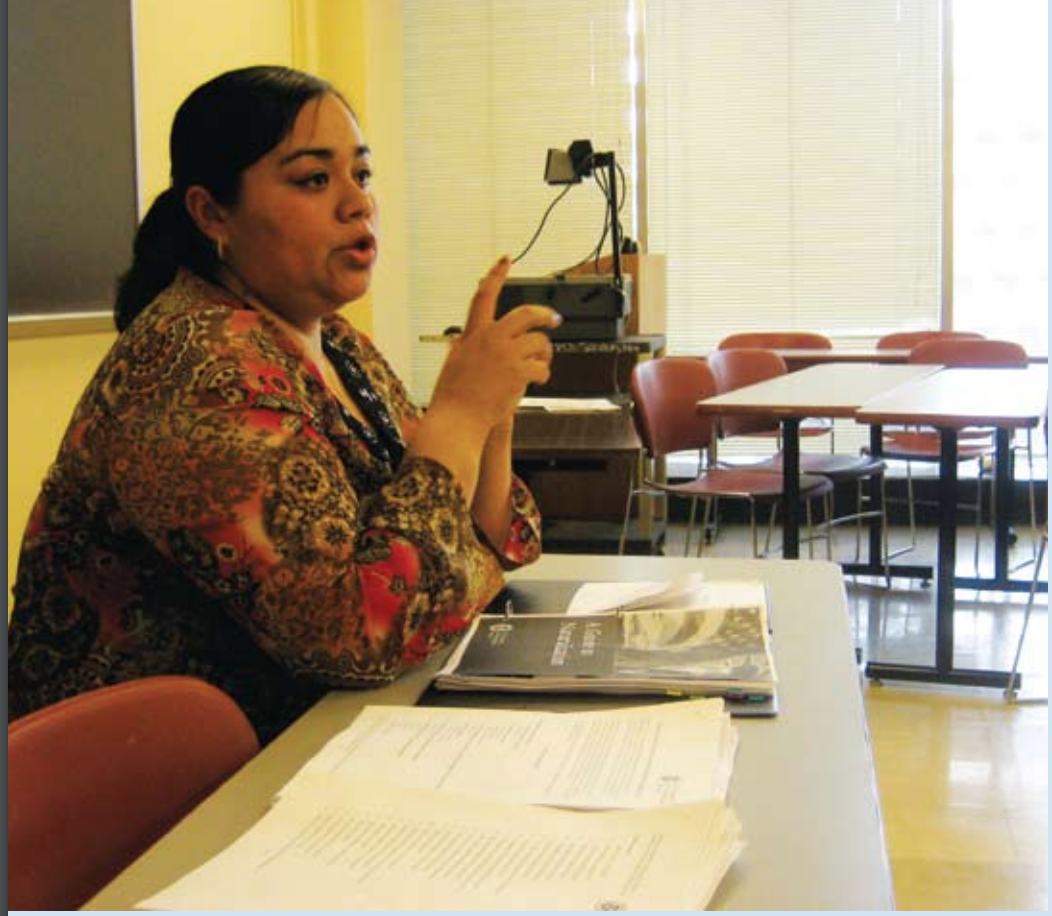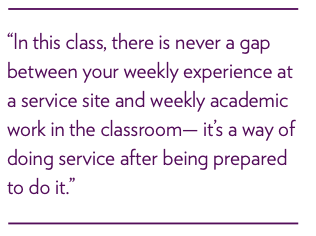Class Reaches Out to
Diverse Communities 
Through Tardy’s class, students gain
experience at a range of community centers
-- including a small classroom at the Telpochcalli
Education Project in the southwest side
neighborhood of Little Village and at the Albany
Park Community Center, a large communitybased organization on the city’s northwest side.
Robyn Franko, who graduated from DePaul in
March with a degree in English, calls her service
learning work at the Albany Park Community
Center “probably my favorite experience in
college. It allowed me to see how the other half
lives. I grew up in the suburbs, and never saw this
kind of community diversity. It was a real eyeopener – I had to learn how to explain myself
17 ways for 17 students.” Franko was required to
be at the site once a week but usually chose to
be there twice a week. She points out how the
class combined what they learned in class at
DePaul and what they found when they taught
in a community-based classroom. “In the DePaul
class,” she noted, “I learned a lot about theory – in
Albany Park I learned about the application of
that theory.”
One day at the site, students were given a
page with images of nearly twenty specific topics,
like work, sports, friends and family, and were
asked to identify them. The exercise, like many
others, gave Franko and the students a chance
to build key skills. “This experience helped me
develop the ability to listen and decipher what
people are saying,” Franko explained. “I learned
more about how to be patient and flexible.
Students learned to identify specific words and
situations, and how to talk about them.”
Franko says she would like to continue working
in Albany Park as a volunteer. In Chicago’s Uptown community, Muhammad Luqman expressed
a similar sentiment based on his experience teaching at the Indo-American Community Center.
Luqman, a senior in International Studies, said that
“this experience was really about ‘learning as you
go’ – for me, as well as for the students.” On one
level, Luqman understands the everyday challenges and needs of students at the Center, which
serves South Asian immigrants. Luqman, who
grew up in Pakistan, lives with his wife and two
children and drives a cab in Chicago. “I had faced
many of the questions these people face as an
immigrant,” he says. “It was a nice experience to be
able to work with them – a combination of providing a service to them, observing, and then writing
about it for my class.”
Zachary Brenner, a senior majoring in Religious Studies at DePaul, completed his service
learning experience at Telpochcalli Community
Education Project where he mostly worked with
Mexican immigrants. “The experience I had in this
class was really about how to develop personal
relationships,” he says. “I found that if one could
do that, that facilitates learning to a great extent. If
two people come into a situation and are receptive
to embracing each other’s ideas, there is always a
common human bond that can be formed.”
Brenner also notes how his experience in the
classroom and service site reinforced each other.
“In this class, there is never a gap between your
weekly experience at a service site and weekly
academic work in the classroom – they inform
each other,” he says. “It’s a way of doing service
after being prepared to do it.”

Sites Reflect Value of
Service Learning
Maria Velazquez, who coordinates the adult
program for Telpochcalli, says the class enables
adult students at that site to share what they need
with DePaul students, often in a way that reflects
daily challenges many Americans may take for
granted. “Parents might ask what they need to say
when they go to a hospital or make appointments,”
she says. “These are very important concerns, and
of course language can be a barrier in many situations.”
At the Albany Park Community Center, DePaul students like Franko participate in an ESL
program that is making a difference for scores of
people who depend on it to learn a new language.
More than 1,000 people a year take ESL classes at
the Center, according to Michelle Fleming, adult
literacy and volunteer director at the site. Albany
Park community is also one of the most diverse
communities in Chicago with over 40 different
languages spoken in public schools. Fleming says
that one major benefit of having DePaul students
in ESL classrooms at the site is simply “having
another English speaker in the class. Students hear
another voice. We find that when students are not
here, we miss them.” “Language acquisition in this
class is like a patchwork quilt – people bring very
different ‘patches’ to the classroom. adds Grace
Watson, who teaches ESL classes at the site.”
“DePaul students can do things I don’t have time
to do. That’s so important, because it means my
students receive more attention.”
For Tardy, the service learning experience
students go through exposes them to something
they could not have fully anticipated. Yes, preparation in the classroom, reflection and applying what
they have learned while teaching adult learners are
all essential parts of the experience. She suggests,
however, that there’s also an excitement and vitality about teaching ESL that students remember.
“What happens is, students show up to these sites
and it’s real life and has a rich context,” she says.
That’s the nature of teaching – it’s never exactly as
you expect it’s going to be.”